Abstract
I SUGGEST that the anomalous xenon isotopic composition known as carbonaceous chondrite fission (CCF) xenon is not caused by fission, but is the direct result of a modified r-process nucleosynthesis which produces an abundance peak at Z = 54 and the magic neutron number N = 82. I further propose that the xenon so produced (‘R xenon’) was trapped in dust grains, which were subsequently incorporated in the solar system with minimal degassing. This hypothesis also provides a natural explanation for the intimate association between R xenon and a newly discovered xenon component in primitive meteorites1,2.
This is a preview of subscription content, access via your institution
Access options
Subscribe to this journal
Receive 51 print issues and online access
$199.00 per year
only $3.90 per issue
Buy this article
- Purchase on Springer Link
- Instant access to full article PDF
Prices may be subject to local taxes which are calculated during checkout
Similar content being viewed by others
References
Phinney, D. L., Meteoritics, 4 (1973).
Manuel, O. K., Henneke, E. W., and Sabu, D. D., Nature, 240, 99 (1972).
Alexander, E. C. Jr, Lewis, R. S., Reynolds, J. H., and Michel, M. C., Science, 172, 837 (1971).
Reynolds, J. H., and Turner, G., J. geophys. Res., 69, 3263 (1964).
Hoffman, D. C., and Hoffman, M. M., A. Rev. nucl. Sci., 24 (in the press).
Anders, E., and Heymann, D., Science, 164, 821 (1969).
Rao, M. N., Nucl. Phys., A, 140, 69 (1970).
Takaota, N., Mass Spectroscopy, 20, 287 (1972).
Phinney, D. L., thesis, Univ. Minnesota (1971).
Pepin, R. O. in Origin and Distribution of the Elements, 379 (Pergamon, Oxford, 1968).
Eugster, O., Eberhardt, P., and Geiss, J., Earth planet Sci. Lett., 1, 99 (1966).
Marti, K., Meteoritics, 5, 208 (1970).
Sabu, D. D., Henneke, E. W., and Manuel, O. K., Nature, 251, 21 (1974).
Black, D. C., and Pepin, R. O., Earth planet. Sci. Lett., 6, 395 (1969).
Black, D. C., Geochim. cosmochim. Acta, 36, 377 (1972).
Clayton, R. N., Grossman, L., and Mayeda, T. K., Science, 182, 485 (1973).
Gray, C. M., and Compston, W., Nature, 251, 495 (1974).
Lee, T., and Papanastassiou, D. A., Geophys. Res. Lett., 1, 227 (1974).
Cameron, A. G. W., and Pine, M. R., Icarus, 18, 377 (1973).
Cameron, A. G. W., Space Sci. Rev., 15, 121 (1973).
Hoyle, F., and Fowler, W. A., Nature, 241, 384 (1973).
Black, D. C., in On the Origin of the Solar System, 236 (CNRS, Paris, 1972).
Author information
Authors and Affiliations
Rights and permissions
About this article
Cite this article
BLACK, D. Alternative hypothesis for the origin of CCF xenon. Nature 253, 417–419 (1975). https://doi.org/10.1038/253417a0
Received:
Revised:
Issue Date:
DOI: https://doi.org/10.1038/253417a0
This article is cited by
-
Neutron capture cross-sections of stable xenon isotopes and their application in stellar nucleosynthesis
Astrophysics and Space Science (1983)
-
Host phases and origin of noble gases in meteorites
Naturwissenschaften (1981)
-
Isotopes of tellurium, xenon and krypton in Allende meteorite retain record of nucleosynthesis
Nature (1979)
-
Supernovae and the origin of the solar system
Space Science Reviews (1979)
-
Nucleosynthesis and anomalous Xe and Kr in carbonaceous chondrites
Nature (1976)
Comments
By submitting a comment you agree to abide by our Terms and Community Guidelines. If you find something abusive or that does not comply with our terms or guidelines please flag it as inappropriate.



